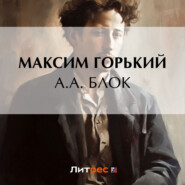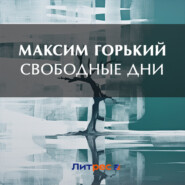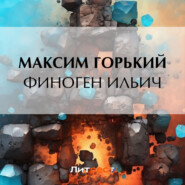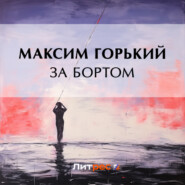По всем вопросам обращайтесь на: info@litportal.ru
(©) 2003-2025.
✖
Mother
Настройки чтения
Размер шрифта
Высота строк
Поля
"Shall I bring you an omelette?"
"No, thank you, I don't want it; the shouts frightened me."
The girl walked up to the table and began to speak excitedly in hasty, terror-stricken tones:
"How the police commissioner beat him! I stood near and could see. All his teeth were broken. He spit out and his teeth fell on the ground. The blood came thick – thick and dark. You couldn't see his eyes at all; they were swollen up. He's a tar man. The sergeant is in there in our place drunk, but he keeps on calling for whisky. They say there was a whole band of them, and that this bearded man was their elder, the hetman. Three were captured and one escaped. They seized a teacher, too; he was also with them. They don't believe in God, and they try to persuade others to rob all the churches. That's the kind of people they are; and our peasants, some of them pitied him – that fellow – and others say they should have settled him for good and all. We have such mean peasants here! Oh, my! oh, my!"
The mother, by giving the girl's disconnected, rapid talk her fixed attention, tried to stifle her uneasiness, to dissipate her dismal forebodings. As for the girl, she must have rejoiced in an auditor. Her words fairly choked her and she babbled on in lowered voice with greater and greater animation:
"Papa says it all comes from the poor crop. This is the second year we've had a bad harvest. The people are exhausted. That's the reason we have such peasants springing up now. What a shame! You ought to hear them shout and fight at the village assemblies. The other day when Vosynkov was sold out for arrears he dealt the starosta (bailiff) a cracking blow on the face. 'There are my arrears for you!' he says."
Heavy steps were heard at the door. The mother rose to her feet with difficulty. The blue-eyed peasant came in, and taking off his hat asked:
"Where is the baggage?"
He lifted the valise lightly, shook it, and said:
"Why, it's empty! Marya, show the guest the way to my house," and he walked off without looking around.
"Are you going to stay here overnight?" asked the girl.
"Yes. I'm after lace; I buy lace."
"They don't make lace here. They make lace in Tinkov and in Daryina, but not among us."
"I'm going there to-morrow; I'm tired."
On paying for the tea she made the girl very happy by handing her three kopecks. On the road the girl's feet splashed quickly in the mud.
"If you want to, I'll run over to Daryina, and I'll tell the women to bring their lace here. That'll save your going there. It's about eight miles."
"That's not necessary, my dear."
The cold air refreshed the mother as she stepped along beside the girl. A resolution slowly formulated itself in her mind – confused, but fraught with a promise. She wished to hasten its growth, and asked herself persistently: "How shall I behave? Suppose I come straight out with the truth?"
It was dark, damp, and cold. The windows of the peasants' huts shone dimly with a motionless reddish light; the cattle lowed drowsily in the stillness, and short halloos reverberated through the fields. The village was clothed in darkness and an oppressive melancholy.
"Here!" said the girl, "you've chosen a poor lodging for yourself. This peasant is very poor." She opened the door and shouted briskly into the hut: "Aunt Tatyana, a lodger has come!" She ran away, her "Good-by!" flying back from the darkness.
The mother stopped at the threshold and peered about with her palm above her eyes. The hut was very small, but its cleanness and neatness caught the eye at once. From behind the stove a young woman bowed silently and disappeared. On a table in a corner toward the front of the room burned a lamp. The master of the hut sat at the table, tapping his fingers on its edge. He fixed his glance on the mother's eyes.
"Come in!" he said, after a deliberate pause.
"Tatyana, go call Pyotr. Quick!"
The woman hastened away without looking at her guest. The mother seated herself on the bench opposite the peasant and looked around – her valise was not in sight. An oppressive stillness filled the hut, broken only by the scarcely audible sputtering of the lamplight. The face of the peasant, preoccupied and gloomy, wavered in vague outline before the eyes of the mother, and for some reason caused her dismal annoyance.
"Well, why doesn't he say something? Quick!"
"Where's my valise?" Her loud, stern question coming suddenly was a surprise to herself. The peasant shrugged his shoulders and thoughtfully gave the indefinite answer:
"It's safe." He lowered his voice and continued gloomily: "Just now, in front of the girl, I said on purpose that it was empty. No, it's not empty. It's very heavily loaded."
"Well, what of it?"
The peasant rose, approached her, bent over her, and whispered: "Do you know that man?"
The mother started, but answered firmly:
"I do."
Her laconic reply, as it were, kindled a light within her which rendered everything outside clear. She sighed in relief. Shifting her position on the bench, she settled herself more firmly on it, while the peasant laughed broadly.
"I guessed it – when you made the sign – and he, too. I asked him, whispering in his ear, whether he knows the woman standing on the steps."
"And what did he say?"
"He? He says 'there are a great many of us.' Yes – 'there are a great many of us,' he says."
The peasant looked into the eyes of his guest questioningly, and, smiling again, he continued:
"He's a man of great force, he is brave, he speaks straight out. They beat him, and he keeps on his own way."
The peasant's uncertain, weak voice, his unfinished, but clear face, his open eyes, inspired the mother with more and more confidence. Instead of alarm and despondency, a sharp, shooting pity for Rybin filled her bosom. Overwhelmed by her feelings, unable to restrain herself, she suddenly burst out in bitter malice:
"Robbers, bigots!" and she broke into sobs.
The peasant walked away from her, sullenly nodding his head.
"The authorities have hired a whole lot of assistants to do their dirty work for them. Yes, yes." He turned abruptly toward the mother again and said softly: "Here's what I guessed – that you have papers in the valise. Is that true?"
"Yes," answered the mother simply, wiping away her tears. "I was bringing them to him."
He lowered his brows, gathered his beard into his hand, and looking on the floor was silent for a time.
"The papers reached us, too; some books, also. We need them all. They are so true. I can do very little reading myself, but I have a friend – he can. My wife also reads to me." The peasant pondered for a moment. "Now, then, what are you going to do with them – with the valise?"
The mother looked at him.
"I'll leave it to you."
He was not surprised, did not protest, but only said curtly, "To us," and nodded his head in assent. He let go of his beard, but continued to comb it with his fingers as he sat down.
With inexorable, stubborn persistency the mother's memory held up before her eyes the scene of Rybin's torture. His image extinguished all thoughts in her mind. The pain and injury she felt for the man obscured every other sensation. Forgotten was the valise with the books and newspapers. She had feelings only for Rybin. Tears flowed constantly; her face was gloomy; but her voice did not tremble when she said to her host:
"They rob a man, they choke him, they trample him in the mud – the accursed! And when he says, 'What are you doing, you godless men?' they beat and torture him."
"Power," returned the peasant. "They have great power."
"No, thank you, I don't want it; the shouts frightened me."
The girl walked up to the table and began to speak excitedly in hasty, terror-stricken tones:
"How the police commissioner beat him! I stood near and could see. All his teeth were broken. He spit out and his teeth fell on the ground. The blood came thick – thick and dark. You couldn't see his eyes at all; they were swollen up. He's a tar man. The sergeant is in there in our place drunk, but he keeps on calling for whisky. They say there was a whole band of them, and that this bearded man was their elder, the hetman. Three were captured and one escaped. They seized a teacher, too; he was also with them. They don't believe in God, and they try to persuade others to rob all the churches. That's the kind of people they are; and our peasants, some of them pitied him – that fellow – and others say they should have settled him for good and all. We have such mean peasants here! Oh, my! oh, my!"
The mother, by giving the girl's disconnected, rapid talk her fixed attention, tried to stifle her uneasiness, to dissipate her dismal forebodings. As for the girl, she must have rejoiced in an auditor. Her words fairly choked her and she babbled on in lowered voice with greater and greater animation:
"Papa says it all comes from the poor crop. This is the second year we've had a bad harvest. The people are exhausted. That's the reason we have such peasants springing up now. What a shame! You ought to hear them shout and fight at the village assemblies. The other day when Vosynkov was sold out for arrears he dealt the starosta (bailiff) a cracking blow on the face. 'There are my arrears for you!' he says."
Heavy steps were heard at the door. The mother rose to her feet with difficulty. The blue-eyed peasant came in, and taking off his hat asked:
"Where is the baggage?"
He lifted the valise lightly, shook it, and said:
"Why, it's empty! Marya, show the guest the way to my house," and he walked off without looking around.
"Are you going to stay here overnight?" asked the girl.
"Yes. I'm after lace; I buy lace."
"They don't make lace here. They make lace in Tinkov and in Daryina, but not among us."
"I'm going there to-morrow; I'm tired."
On paying for the tea she made the girl very happy by handing her three kopecks. On the road the girl's feet splashed quickly in the mud.
"If you want to, I'll run over to Daryina, and I'll tell the women to bring their lace here. That'll save your going there. It's about eight miles."
"That's not necessary, my dear."
The cold air refreshed the mother as she stepped along beside the girl. A resolution slowly formulated itself in her mind – confused, but fraught with a promise. She wished to hasten its growth, and asked herself persistently: "How shall I behave? Suppose I come straight out with the truth?"
It was dark, damp, and cold. The windows of the peasants' huts shone dimly with a motionless reddish light; the cattle lowed drowsily in the stillness, and short halloos reverberated through the fields. The village was clothed in darkness and an oppressive melancholy.
"Here!" said the girl, "you've chosen a poor lodging for yourself. This peasant is very poor." She opened the door and shouted briskly into the hut: "Aunt Tatyana, a lodger has come!" She ran away, her "Good-by!" flying back from the darkness.
The mother stopped at the threshold and peered about with her palm above her eyes. The hut was very small, but its cleanness and neatness caught the eye at once. From behind the stove a young woman bowed silently and disappeared. On a table in a corner toward the front of the room burned a lamp. The master of the hut sat at the table, tapping his fingers on its edge. He fixed his glance on the mother's eyes.
"Come in!" he said, after a deliberate pause.
"Tatyana, go call Pyotr. Quick!"
The woman hastened away without looking at her guest. The mother seated herself on the bench opposite the peasant and looked around – her valise was not in sight. An oppressive stillness filled the hut, broken only by the scarcely audible sputtering of the lamplight. The face of the peasant, preoccupied and gloomy, wavered in vague outline before the eyes of the mother, and for some reason caused her dismal annoyance.
"Well, why doesn't he say something? Quick!"
"Where's my valise?" Her loud, stern question coming suddenly was a surprise to herself. The peasant shrugged his shoulders and thoughtfully gave the indefinite answer:
"It's safe." He lowered his voice and continued gloomily: "Just now, in front of the girl, I said on purpose that it was empty. No, it's not empty. It's very heavily loaded."
"Well, what of it?"
The peasant rose, approached her, bent over her, and whispered: "Do you know that man?"
The mother started, but answered firmly:
"I do."
Her laconic reply, as it were, kindled a light within her which rendered everything outside clear. She sighed in relief. Shifting her position on the bench, she settled herself more firmly on it, while the peasant laughed broadly.
"I guessed it – when you made the sign – and he, too. I asked him, whispering in his ear, whether he knows the woman standing on the steps."
"And what did he say?"
"He? He says 'there are a great many of us.' Yes – 'there are a great many of us,' he says."
The peasant looked into the eyes of his guest questioningly, and, smiling again, he continued:
"He's a man of great force, he is brave, he speaks straight out. They beat him, and he keeps on his own way."
The peasant's uncertain, weak voice, his unfinished, but clear face, his open eyes, inspired the mother with more and more confidence. Instead of alarm and despondency, a sharp, shooting pity for Rybin filled her bosom. Overwhelmed by her feelings, unable to restrain herself, she suddenly burst out in bitter malice:
"Robbers, bigots!" and she broke into sobs.
The peasant walked away from her, sullenly nodding his head.
"The authorities have hired a whole lot of assistants to do their dirty work for them. Yes, yes." He turned abruptly toward the mother again and said softly: "Here's what I guessed – that you have papers in the valise. Is that true?"
"Yes," answered the mother simply, wiping away her tears. "I was bringing them to him."
He lowered his brows, gathered his beard into his hand, and looking on the floor was silent for a time.
"The papers reached us, too; some books, also. We need them all. They are so true. I can do very little reading myself, but I have a friend – he can. My wife also reads to me." The peasant pondered for a moment. "Now, then, what are you going to do with them – with the valise?"
The mother looked at him.
"I'll leave it to you."
He was not surprised, did not protest, but only said curtly, "To us," and nodded his head in assent. He let go of his beard, but continued to comb it with his fingers as he sat down.
With inexorable, stubborn persistency the mother's memory held up before her eyes the scene of Rybin's torture. His image extinguished all thoughts in her mind. The pain and injury she felt for the man obscured every other sensation. Forgotten was the valise with the books and newspapers. She had feelings only for Rybin. Tears flowed constantly; her face was gloomy; but her voice did not tremble when she said to her host:
"They rob a man, they choke him, they trample him in the mud – the accursed! And when he says, 'What are you doing, you godless men?' they beat and torture him."
"Power," returned the peasant. "They have great power."

















